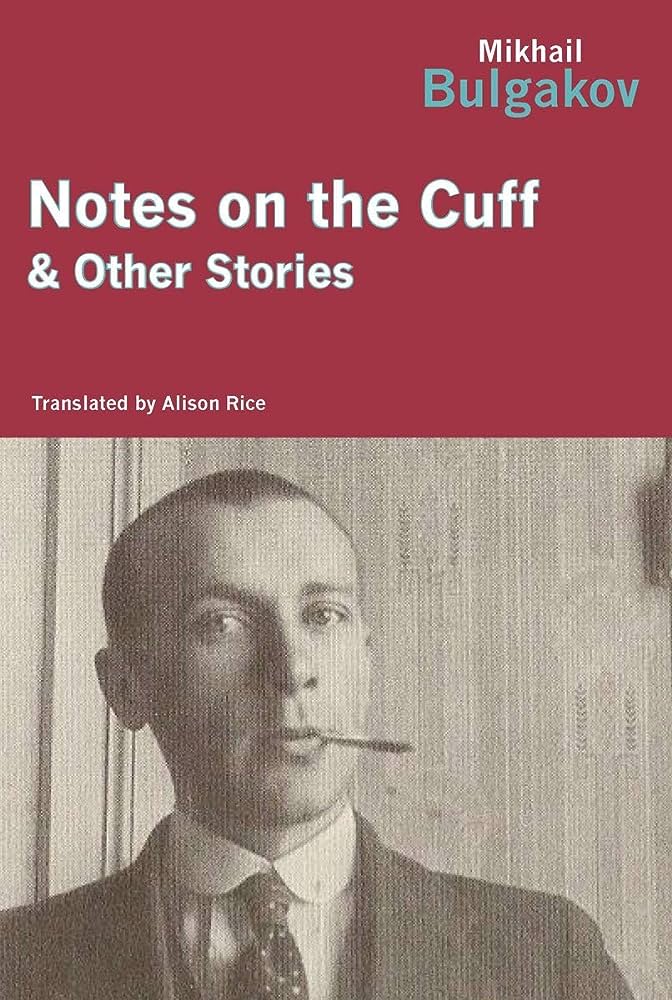Newly released
This book is new and will be uploaded as soon as it becomes available to us and if we secure the necessary publishing rights.

Notes on the Cuff and Other Stories Book PDF
(0)
Author:
Mikhail BulgakovNumber Of Reads:
85
Language:
English
Category:
literatureSection:
Pages:
68
Quality:
excellent
Views:
857
Quate
Review
Save
Share
Book Description
The book Notes on the Cuff & Other Stories presents a collection of Bulgakov's early short stories and feuilletons, translated for the first time. These stories offer an insightful glimpse into Bulgakov's personal struggles with the absurdities of Moscow's bureaucracy. One notable incident recounts the morning he arrived at work only to find his office mysteriously disappeared overnight.
Through diverse feature articles written for Russian emigres in Berlin, Bulgakov provides a personal perspective on post-revolutionary Russia. Among the anecdotes, he shares the story of a friend who cleverly "remodels" his apartment to outsmart the new Soviet housing authorities and reports on the trial of a cab-driver turned mass murderer, targeting peasant horse traders.
Skillfully translated, these stories are highly recommended additions to most libraries, offering a valuable insight into the early works of Mikhail Bulgakov.
Mikhail Bulgakov
Mikhail Avanisevts Bulgakov, a Russian novelist and playwright, was born on May 15, 1891, in Kyiv, and he passed away on March 10, 1940, in Moscow. Initially, Bulgakov worked as a doctor, but he is best known for his novel "The Master and Margarita," which was published posthumously, three decades after his death. He was born into the family of a professor at the Kyiv Religious Academy, and he spent his childhood and youth in Kyiv. This city would later serve as a significant setting in his novel "The White Guard," becoming an expression of his deep connection to family and homeland, as evident in his article "Kyiv-City" from 1923.
Bulgakov attended the medical faculty of Kyiv University in 1909 and graduated with distinction in 1916, earning a degree as a medical doctor. During the 1920s, he explored the theme of social upheaval and its impact on human nature through satirical essays, stories, and anecdotes. Works like "Satanic Show" (1924) and "Deadly Eggs" (1925) exemplify his unique satirical literary style, which both fascinated and alarmed his contemporaries.
"The Heart of a Dog" (1925) was another satirical novel by Bulgakov that reflected the same direction of his sharp wit. Despite admiration from some, others refused to publish these works due to their scathing critique of the era.
The turning point in Bulgakov's career came with the publication of his novel "The White Guard." In 1925, the novel's two parts were published in the magazine "Russia," and it later gained further acclaim when adapted into the play "Days of the Turbins" at the Moscow Art Theater MKHAT in 1926. The play's success with audiences, including the attention of Stalin himself, was met with harsh criticism from the authorities, who accused Bulgakov of anti-Soviet sentiments. This led to the play's temporary withdrawal from the theater program in 1929, though it was shown again in 1932.
Bulgakov's international fame, however, came with his novel "The Master and Margarita," an extraordinary work that encompassed the themes from his previous creations and the essence of Russian and world classical literature. While the novel gained immense recognition globally, it faced censorship in the Soviet Union and was only published there in an abridged edition in 1966, long after the author's passing. Bulgakov consciously crafted this novel as a culminating masterpiece, blending various motifs and literary influences, solidifying his status as a prominent figure in Russian literature.
Book Currently Unavailable
This book is currently unavailable for publication. We obtained it under a Creative Commons license, but the author or publisher has not granted permission to publish it.
Rate Now
5 Stars
4 Stars
3 Stars
2 Stars
1 Stars
Notes on the Cuff and Other Stories Quotes
Top Rated
Latest
Quate
Be the first to leave a quote and earn 10 points
instead of 3
Comments
Be the first to leave a comment and earn 5 points
instead of 3